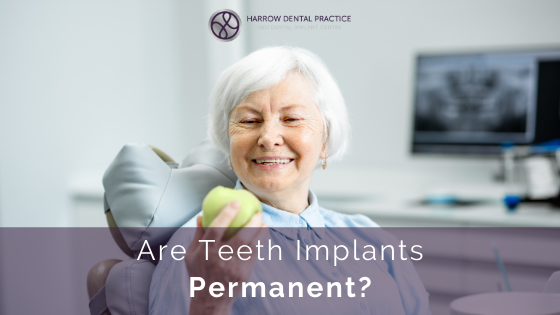Gone are the days when dentists only used removable dentures for replacing missing teeth. Today, much more durable and aesthetically pleasant options are available, such as dental implants.
An implant is a screw-shaped titanium post which serves as an artificial tooth root. Once it becomes fully anchored within the jawbone, the dentist then attaches a suitable prosthesis over it – depending on the number of missing teeth – to complete the artificial tooth.
While dental implants have been popular worldwide as the most preferred tooth replacement option, many people are still unaware of how implants work or whether they are long-term tooth replacement option. If you are thinking of getting your missing teeth replaced with dental implants, this article will provide all the information you need to make an informed decision.
Truth About Dental Implants
Dental implants are shaped just like a tooth root – and function like them too. Similarly, like the natural teeth, the implants are anchored within the bone. As a result, dental implants offer a solid foundation for the artificial teeth – the crowns, bridges or dentures attached to them. Since the dental implants remain fixed within the jawbone, they also restore one’s ability to eat and speak without difficulty. You can eat all your favourite foods – even the hard ones – without any problem.
However, dental implants are indeed more expensive than other tooth replacement options. However, considering their numerous advantages, such as their safety, long life and aesthetics, their high cost is a minor drawback.
How Long Do Dental Implants Last?
Dental implants are one of the most durable tooth replacement options currently available. The implants are made from high-quality titanium alloys, which makes them extremely resilient and durable. Research has shown that dental over 90% of dental implants last beyond 10 years. According to the American Academy of Implant Dentistry, well care and looked after dental implants can even last for a lifetime. Similarly, the American Association of Oral and Maxillofacial Surgeons states an implant success rate of 95%
Can You Have Dental Implants With Receding Gums?
Like natural teeth, the presence of healthy gum tissues around an implant will significantly increase the chances of its success. However, this does not mean that gum recession individuals cannot get their teeth replaced with dental implants.
During your initial appointment, your dentist will determine the underlying cause of gum recession. In the early stages, gum recession can be treated with professional cleaning. Your dentist may also perform a crown lengthening procedure. In this procedure, your dentist will detach the gums and replace them at a higher position where they cover the implant surface. In advanced cases where there is widespread gum recession, your dentist may need to perform gum grafting. According to the American Academy of Periodontology, gum graft surgery is a procedure in which your dentist will take soft tissue grafts from another body site to compensate for the lost gum tissue.
What’s The Link Between Periodontal Disease An Implant Failure?
Dental implants look, function and feel just like natural teeth. While this is an upside, the downside of dental implants is that they can also get diseased like a real tooth. If regular oral hygiene maintenance is not ensured around an implant, or if there is insufficient gum tissue to cover the implant-restoration junction, plaque and tartar deposits begin to form around the implant. Over time, these bacteria release toxins and cause inflammation of the soft tissue around the implant. This condition is known as peri-implantitis, and it is one of the most common causes of implant failure.
Will Getting Dentures Stop Gum Disease?
Gum disease is caused by two main factors; poor general oral health and harmful bacteria. Hence, gum disease management involves removing the plaque and tartar deposits from the teeth through professional cleaning – or other advanced periodontal procedures – if necessary. Unfortunately, getting dentures will not help with the cessation of gum disease. Instead, it may worsen the situation if oral hygiene maintenance is not ensured optimally.
Will Tooth Extraction Cure Periodontal Disease?
Tooth loss is the leading cause of long term gum disease. According to the World Health Organization (WHO), about 10% of the world population have lost a tooth because of gum inflammation. As discussed earlier, the only treatment of periodontal disease is strict oral hygiene maintenance and removal of plaque and calculus deposits on the teeth with professional cleaning. Getting your teeth extracted will not help in treating gum disease.
How Long Do Dental Implants Take To Heal?
Once your dentist places an implant inside the bone, he or she will place a healing collar over it. This is done to ensure the implant site’s uninterrupted healing- which generally takes anywhere between four to six months. Once the implant site has healed properly, and bone tissue has formed around the implant, only then will your dentist attach a prosthesis over it.
How Long Does A Dental Implant Procedure Take?
The time needed for the placement of dental implants depends on various factors, such as the site and the number of implants to be placed. On average, the surgical procedure for the placement on an implant can take anywhere between one to two hours. The duration may be prolonged if your dentist needs to perform an additional procedure like bone graft. Don’t worry; this procedure won’t be painful as your dentist will perform it under the effect of local or general anaesthesia.
Looking for top-quality, long-lasting dental implants in Hornchurch? Our implant dentist, Dr Saleha Aria and Prosthodontist, Dr Safa Somi at Harrow Dental Practice, can help. Whether you seek dental implants for tooth replacement or braces for missing teeth, Harrow Dental Practice offers all dental care services under one roof.
A beautiful smile with dental implants awaits you at Harrow Dental. Not sure about implants? Book a free consultation appointment today and get honest advice from our dentists.

